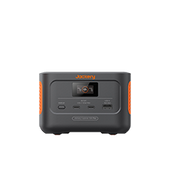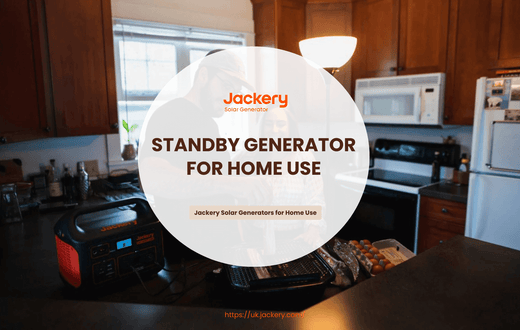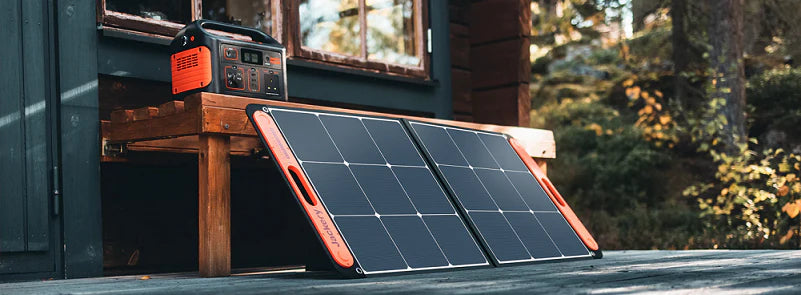When a hurricane or power outage strikes, a reliable standby generator for a home will be your strongest ally in the unpredictable world of power outages and frequent blackouts. A standby generator keeps your home running during storms and power outages.
Therefore, equipping your home with a reliable standby generator in the UK is a sound investment. This comprehensive guide to the best standby generators for home use explains everything you need to know, including how they work, their types, the right size, and how to choose the best standby generator for your home.
Usually, a standby generator uses propane, gas, or diesel fuel. However, you can consider a solar generator safer at home and more suitable for charging specific appliances indoors. We recommend the Jackery Solar Generator as your emergency generator. It doesn't take up much more space than others in your home.
|
Key Takeaways: |
|
- Standby generators can seamlessly switch from grid power to backup power. - Choosing the right size standby generator for home is extremely important for family life during power outages. - Home standby generators can be divided into several types depending on the fuel used. - In addition to power requirements, several other factors must be considered when choosing the best standby generator for a home. - Jackery Solar Generator 1000 Plus and 2000 Plus with expandable battery packs are perfect for dealing with emergencies or power outages. - Whether buying a standby generator for your home depends on your needs and the local power supply. |
What Is A Standby Generator?
Standby generators are essential to the power system, ensuring a stable power supply when the utility power is interrupted. Standby generators provide backup power for your residential, commercial and industrial applications and facilities during a power outage.
Unlike primary or continuous generators, standby generators are only used during scheduled power outages caused by severe weather, natural or artificial disasters, or ageing power grids. In addition, standby generators are usually fixed, require a concrete foundation as a foundation, and are typically installed outside your facility.

How Does A Standby Generator Work?
A standby generator is widely used in hospitals, data centres, communication hubs, and critical industrial facilities. Its working principle mainly includes the following key steps:
Step 1: Detecting Power Outages
The standby generator's core component is the automatic transfer switch (ATS), which can continuously monitor the incoming utility power. When the utility power is interrupted, the ATS can quickly sense the power outage and automatically disconnect from the grid in seconds.
Step 2: Start the Engine
When a power outage is detected, the standby generator starts. Typically, it begins within 10 to 30 seconds.
Step 3: Restore Grid Power
The backup generator does not shut down immediately when grid power is restored. Instead, it detects restored grid power and waits a short period (usually a few minutes) to ensure stable power.
The automatic transfer switch then reconnects the home to the grid, and the backup generator continues to run to cool down before shutting down. This process ensures that your home will not experience repeated power outages due to unstable grid power after a significant event.
What Size Standby Generator for Home Do I Need in the UK?
Choosing the right standby generator for home use is vital to ensure that family life is not affected during a power outage. So, what size standby generator do I need in the UK?
Below are two detailed steps to calculate the size of the standby generator you need:
- List the devices that need to be powered by the generator and their wattage.
- Calculate the total wattage requirement.

Step 1: List the Devices that Need To Be Powered by the Generator and Their Wattage
Since the total wattage determines the correct standby generator for the home size, ensure you understand the devices needing power and their wattage requirements. Therefore, please list all the appliances and devices that you want to power during a power outage, including, but not limited to, refrigerators, air conditioners, TVs, computers, lighting fixtures, etc.
Wattage information can usually be found in the user manual or on the appliance information plate. Some appliances may have a starting wattage requirement, generally 2 to 3 times the running wattage.
The table below shows the starting and running wattage information for some common appliances in the UK.
|
Appliance |
Running Wattage |
Starting Wattage |
|
Refrigerator |
700W |
2000W |
|
Dishwasher |
1300W |
1800W |
|
Washing Machine |
1100W |
2200W |
|
Light Bulb |
25-75W |
0W |
|
TV |
60-300W |
0W |
|
Microwave |
600-1000W |
0W |
|
Vacuum |
1400W |
2500W |
|
Coffee Maker |
550W |
0W |
|
Blender |
300W |
800W |
|
Dryer |
5000W |
7000W |
|
Space Heater |
2000W |
0W |
|
Computer |
300W |
0W |
Step 2: Calculate Total Power Needed
Add up the running power of all appliances to get the total running power. Also, the appliance with the highest starting power will be your peak power demand. Here is an example:
700W (refrigerator) + 900W (toaster) + 75W (light) + 300W (laptop) + 1000W (coffee maker) = 2975W
- The highest starting power or peak power is for the heating system, which is 2200W.
- Therefore, you need a standby generator for a home that can handle at least 2975W of running power and 2200W of starting power.
Considering the worst-case scenario, where all appliances start simultaneously, multiply the total running power by a safety factor (usually 1.25) to ensure that the standby generator for the home has enough margin to handle the starting power.
So, assuming a running power demand of 2975W and a starting power demand of 2200W, what size standby generator does the home need to operate safely?
2975W * 1.25 (safety factor) = 3718.75W
Therefore, your home needs at least a 4000W standby generator. Remember that the above data are averages, and the power consumption of your appliances may vary.
Step 3: Common Sizes of standby generators for homes in the UK
There is no uniform standard for the size of standby generators for homes commonly used in the UK, depending on the household's power needs and budget. Here are some common types of standby generators for homes and their applicable scenarios:
Small standby generators for home (5-10kW): A 5-10kW standby generator for a home is suitable for tiny homes or apartments and can provide power for basic living facilities such as lighting, refrigerators, TVs, etc.
Medium standby generators for home (10-20kW): A 10-20kW standby generator is suitable for medium-sized homes and can support more appliances and equipment, such as air conditioners, washing machines, microwave ovens, etc.
Large standby generators for homes (above 20kW): A standby generator above 20kW is suitable for large homes or villas. It can provide power for almost all household appliances and equipment, even high-power equipment such as electric water heaters and swimming pool pumps.
Types of Standby Generators for Home Use
Standby generators may have different fuel options. Diesel, propane, and natural gas can be used, but models can also be fuelled by all three sources, which has become quite prevalent. The inquiry ultimately concerns optimal fuel, considering availability, cost, efficiency, and environmental impact.
|
Types of Standby Generators |
Advantages |
Disadvantages |
|
Propane Generators |
Lower emissions Extended shelf-life Easy to store in tanks Quiet |
Safety risks Specialised maintenance |
|
Gas Generators |
High efficiency and energy-saving Good environmental performance Stable and reliable operation Quick start-up Low noise |
Origin may not be guaranteed High investment cost Safety risks Temperature sensitivity Complex maintenance |
|
Diesel Generators |
Wide power range High reliability Low operating costs Easy fuel availability Long continuous operation |
Noisier Higher maintenance costs Emits pollutants Safety risks |
Propane Standby Generator
If you are concerned about the environment, the propane generator type suits you. Propane combusts efficiently, resulting in lower emissions, particularly in certain regions. Propane possesses an extended shelf-life, can be conveniently stored in tanks, and propane-specific machines operate more quietly than alternative generators.
Propane issues encompass fuel storage, as larger tanks may appear unattractive in compact residences, and pressurised cylinders pose safety risks. Propane-powered generators are more intricate, necessitating specialised maintenance. The fuel consumption ratio of standby generators for propane is significantly more than that of diesel. If you or your region/community prioritise environmental concerns, propane might be more appropriate.
Natural Gas Standby Generator
In the UK, natural gas is as essential as water and electricity. It is mainly connected to utility grids, ensuring availability during an electrical outage. Similar to propane, natural gas combusts efficiently and operates silently. Pipeline gas, however, is not universally accessible. It may also be subject to reduction whenever a tragedy occurs.
Consequently, if it is your only fuel source, you will be without an alternative for emergency power. The fuel consumption ratio is comparable to that of propane. However, unlike propane, no storage is necessary when the gas is sourced from the pipeline.
Diesel Standby Generator
In contrast to gasoline, natural gas, and propane, diesel is arguably the most secure fuel option for your generator set due to its minimal flammability. Diesel is readily accessible, offered at all petrol stations, and may be stored for 18 to 24 months.
Diesel is optimal for substantial load demands if your residence or enterprise consumes significant electricity. Diesel is economical, and diesel-powered generators incur reduced maintenance expenses.
In summary, standby generators for homes with different fuels have their advantages, disadvantages and applicable scopes. In practical applications, appropriate standby generators for the house should be selected according to specific circumstances to ensure stable and reliable power support during power outages.
Solar Generator VS. Standby Generator for Home
Solar generators are more suitable for home use because they offer a clean, renewable energy source with minimal noise and emissions. This makes them ideal for providing backup power during power outages and being environmentally friendly.
This contrasts traditional standby generators, which require fuel and produce pollutants. Solar generators, like Jackery Solar Generators, can be easily portable and convenient for various situations around the house.

Easy to Store: Solar generators are usually smaller than standby generators, so they can be easily stored in your basement or a corner of your home.
No Specific Maintenance: As mentioned above, the standby generators need careful and professional maintenance. However, the solar generator does not need to be maintained; you only need to clean the generator surface with wet wipes.
Safe to Use at Home: Solar generators are safer at home than standby generators due to battery protection management and specific technology. Generators fueled by gas or diesel can add the potential for explosion or other risks.
Portability: Solar generators are generally more compact and lightweight, facilitating effortless relocation inside the home to energise particular devices.
Clean Energy: Solar energy is obtained from sunshine, a sustainable and clean energy source that generates no detrimental emissions.
Quiet to Operate: Solar generators function silently, unlike gas generators, reducing disruption during power outages.
However, solar generators have some drawbacks compared to standby generators for home use. It is essential to note that solar generators depend on sunlight, so their efficiency may diminish on overcast days. The battery capacity of a solar generator may be insufficient to sustain a household's power needs for prolonged durations. Solar generators may incur a higher initial expense than conventional generators.
Jackery Solar Generators for Home Use
As we stated above, there are many benefits to using solar generators at home. Here, we recommend the Jackery Solar Generator for your home use, which combines Jackery Solar Panels with a Portable Power Station to turn sunlight into electricity. If you worry about the weather in the UK, the Portable Power Station can be recharged by wall outlets or carports.

Compared to standby generators for home use, Jackery Solar Generators adopt LiFePO4 batteries, ensuring expandable power capacities ranging from 99Wh to 12 kWh, which are enough to power low-to-high household appliances such as refrigerators, microwaves, lights, and more. We will introduce Solar Generator 1000 Plus and 2000 Plus for you.
|
Appliances |
Working Hours |
|
|
Jackery Solar Generator 1000 Plus (1.25-5 kWh) |
Jackery Solar Generator 2000 Plus (2-12 kWh) |
|
|
Refrigerator (700W) |
1.5-6.1H |
2.4-14.6H |
|
Computer (200W) |
5.4-21.3H |
8.5-51H |
|
Office Printer (300W) |
3.6-14.2H |
5.7-34H |
|
Lighting (50W) |
21.4-85H |
34-204H |
|
AC (1000W) |
1.1-4.25H |
1.7-10.2H |
Jackery Solar Generator 2000 Plus
Jackery Solar Generator 2000 Plus is more suitable for home use. It is a solid portable power solution that delivers outstanding performance. With its impressive capacity and powerful output, this device can support the operation of essential appliances for weeks, even certain large appliances, such as your refrigerator, computer, AC, etc., in your home.

Expandable Powerhouse for Your Appliances: The Jackery Solar Generator 2000 Plus enables the addition of extra battery packs, increasing the capacity from 2 kWh to an impressive 12 kWh, thereby significantly satisfying your power needs. This solar product has a remarkable output of 3000W, providing a 30% higher rated power than other 2 kWh solar products. Almost all essential appliances are powered.
Safe to Use with ChargeShield: ChargeShield is Jackery's advanced fast charge technology, featuring 62 protective mechanisms, 12 protective algorithms, and four types of physical safety protection. This technology uses a unique stepped variable-speed charging algorithm to enhance safety and extend battery pack lifespan by 50%.
Higher Resistance & Reliability: The Explorer 2000 Plus stands out as a groundbreaking add-on battery pack that offers the convenience of recharging through solar panels. This feature increases versatility, boosts charging efficiency, and shortens charging time. Also, it can be taken indoors safely compared to other traditional backup generators.
|
*Review from Our User |
|
I have been using Jackery batteries for a long time. I felt great excitement upon the release of the Explorer 2000 Plus, which marks the inaugural release of an expendable battery system by Jackery. The system supports a capacity of up to 12kWh with a 3000W 120V output or 24kWh with a 6000W 240V output—an ideal enhancement for my home backup system. |
Jackery Solar Generator 1000 Plus
Jackery Solar Generator 1000 Plus combines SolarSaga 100W solar panels with Explorer 1000 Plus. The Explorer 1000 Plus is the same as the Explorer 2000 Plus, which is the expandable LiFePO4 battery to be added to a 5 kWh capacity. If Jackery Solar Generator 2000 Plus is for charging your appliances for a few weeks, this solar generator is for charging for several days.

Excellent Power Output: The Explorer 1000 Plus power station boasts an excellent 1264Wh long-lasting LiFePO4 battery and a 2000W full-power pure sine wave inverter, supplying almost all required power. Adding up to three additional battery packs will remarkably increase its capacity to 5kWh.
Expandable Powerhouse: Adding up to three extra battery packs lets Jackery's exclusive technology boost the Explorer 1000 Plus capacity from 1.26kWh to 5kWh. Moreover, it has a maximum output of 2000W, 20% more than usual 1kWh LFP generators.
Higher Solar Conversion Rate: The Jackery SolarSaga 100W Solar Panel boasts a solar conversion rate of up to 25%; it is optimally designed for outdoor use and unforeseen power interruptions. The solar panel weighs about 8 lbs, is lightweight, foldable, and equipped with a convenient carry handle, enhancing its portability.
|
*Review from Our User |
|
First, this item is robust and space-efficient, fitting seamlessly in my workspace (see pic). When the power goes out, it becomes a real game changer. I can continue my tasks as if everything is normal, which is impressive. The most advantageous aspect for me? The USB-C ports. I can connect my Mac directly to it without needing an adapter. Incredibly useful! |
How to Choose The Best Standby Generator for Home Use?
The best standby generator for your home should meet your power needs, adapt to your working environment, and provide stable and reliable power support within your budget.
Therefore, choosing the right standby generator for the home is critical to ensure that family life is not affected during power outages. In addition to power needs, there are several factors to consider when choosing a suitable standby generator for your home:
Consider Where to Place the Device
Standby home generators should be placed in a location that is easy to maintain and repair, and the height should be high enough. The minimum distance from combustible walls and building openings should be followed for outdoor and rooftop installations. The fuel supply, ventilation, exhaust ducts, and distance standards from flammable items should be followed for indoor installations. Generally, the generator should be as close to the transfer switch and fuel source as possible.
Automation Function
Standby generators for homes with automatic switching functions can automatically start when the power is out and shut down after the power is restored. The automation function is handy for families that need a continuous power supply, which can reduce the trouble of manual operation and improve safety.
Noise Level
Standby generators for home usually make noise when running, especially in a home environment. Therefore, it is essential to choose a low-noise generator, especially at night or in noise-sensitive areas. Some standby home generators are equipped with silent technology or soundproof covers to reduce the noise level effectively.
Brand and Price
To ensure stability and after-sales service of the equipment, try to choose a well-known brand and reliable quality standby generator for your home. The prices of standby generators for homes on the market vary depending on features, performance and reliability.
In addition to the purchase price, weighing the long-term operating costs, including fuel consumption and maintenance costs, is necessary. Determine a reasonable budget based on the family's financial situation. After weighing the cost and performance, choose the most suitable standby generator for your home.
Installation and Maintenance
Installing a standby generator for a home is a serious matter; if it is not installed correctly, it may cause damage. A professional installer can help you safely connect to the electrical system.
In addition, the manufacturer's maintenance guidelines should be followed for regular inspections and part replacements. Maintenance tasks usually include changing the oil and checking the air filter.
Is a Standby Generator for Home Worth in the UK?
In the UK, buying a standby generator for a home requires careful consideration. It depends on your specific needs and the local power supply. Here are some considerations to help you decide whether a standby generator for a home is worth the investment.
Power Supply Stability: If the power supply in your area is relatively stable and power outages are rare, then buying a standby generator for your home may be a challenge.
However, if you live in a rural area or an area with a less stable power supply, power outages may significantly impact your life. In this case, a standby generator can provide the necessary power guarantee.
Power Outage Frequency and Duration: Although large-scale power outages are uncommon in the UK, local ones still occur frequently. If power outages have a greater impact on your life or work, a standby generator for your home is an option worth considering.
Standby Generators for Home Use FAQs
The following are the frequently asked questions about the standby generators for home use in the UK:
1. Is it worth getting a backup generator in the UK?
In the UK, especially during stormy seasons, many people are no strangers to sudden power outages. In the best-case scenario, most people's daily lives are disrupted when the power goes out, and families may lose basic services such as heating, lighting and cooling.
Standby generators for homes can automatically start, ensuring that more people in the UK can stay safe, comfortable, and functioning during power outages.
2. What size generator will run a normal house?
Choosing the right size standby generator for the home is critical. Typically, 5kW - 8kW generators are suitable for most homes.
|
Size of Generator for A Home |
|
|
5kW Generator |
A 5kW generator is sufficient to power basic home appliances during a power outage. |
|
6.5 kW Generator |
A 6.5kW generator is suitable for small homes with limited appliances. |
|
8kW Generator |
An 8kW generator is ideal for comfortable home backup power. |
3. What size standby generator do you need to run a house in the UK?
The size of the standby generator for the home you need to run your entire home in the UK depends on several factors, including the house size, the number of people living in it, and the electrical equipment you need.
A larger home or a larger population generally means a higher power demand. For example, a small family (2-3 people) may only need a 5-10 kW standby generator for home, while a large family (4+ people) may need a 10 kW+ standby generator. It is recommended to consult a professional standby generator for a home supplier or electrician for personalised advice for your specific needs.
Final Thoughts
No one likes being left in the dark or without essential appliances during a power outage, so a standby generator is critical. While portable generators are a popular short-term solution, a standby generator for the home is a substantial long-term investment that can provide uninterrupted power and keep your appliances running smoothly. In conclusion, investing in the best standby generator for a home in the UK is a wise decision, especially considering the uncertainty of power outages.





































































































